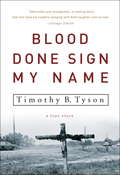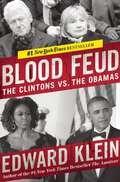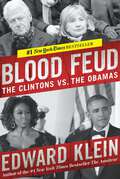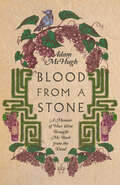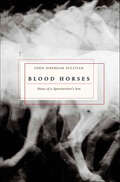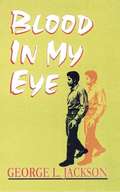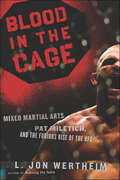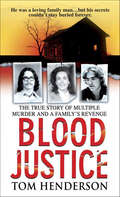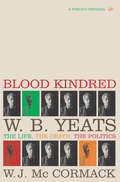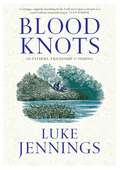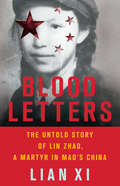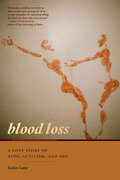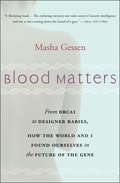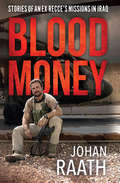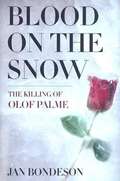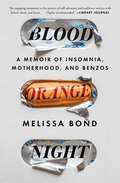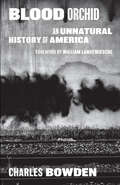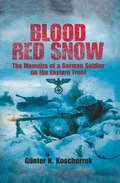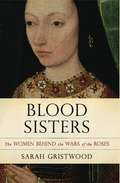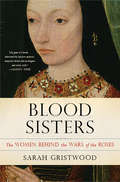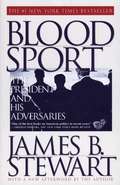- Table View
- List View
Blood Covenant
by Rena Chynoweth Dean M. ShapiroThe youngest of Ervil LeBaron's thirteen wives and mother of two of his fifty-seven children relates the chilling tale of Ervil LeBaron and his polygamous sect, detailing the trail of murder that continues even after his death.
Blood Done Sign My Name: A True Story
by Timothy B. Tyson"Daddy and Roger and 'em shot 'em a nigger." Those words, whispered to ten-year-old Tim Tyson by a playmate, heralded a firestorm that would forever transform the tobacco market town of Oxford, North Carolina. On May 11, 1970, Henry Marrow, a twenty-three-year-old black veteran, walked into a crossroads store owned by Robert Teel and came out running. Teel and two of his sons chased and beat Marrow, then killed him in public as he pleaded for his life. Like many small Southern towns, Oxford had barely been touched by the civil rights movement. But in the wake of the killing, young African Americans took to the streets. While lawyers battled in the courthouse, the Klan raged in the shadows and black Vietnam veterans torched the town's tobacco warehouses. Tyson's father, the pastor of Oxford's all-white Methodist church, urged the town to come to terms with its bloody racial history. In the end, however, the Tyson family was forced to move away. Tim Tyson's riveting narrative of that fiery summer brings gritty blues truth, soaring gospel vision, and down-home humor to a shocking episode of our history. Like To Kill a Mockingbird, Blood Done Sign My Name is a classic portrait of an unforgettable time and place.
Blood Feud: The Clintons Vs. The Obamas
by Edward Klein#1 New York Times Bestseller In this highly anticipated follow-up to his blockbuster The Amateur, former New York Times Magazine editor-in-chief Edward Klein delves into the rocky relationship between the Obamas and the Clintons. An old-school reporter with incredible insider contacts, Klein reveals just how deep the rivalry between the Obamas and the Clintons runs, with details on closed-door meetings buttressed by hundreds of interviews. Blood Feud is a stunning exposé of the animosity, jealousy, and competition between America’s two most powerful political couples.
Blood Feud: The Clintons vs. the Obamas
by Edward Klein#1 New York Times BestsellerIn this highly anticipated follow-up to his blockbuster The Amateur, former New York Times Magazine editor-in-chief Edward Klein delves into the rocky relationship between the Obamas and the Clintons. An old-school reporter with incredible insider contacts, Klein reveals just how deep the rivalry between the Obamas and the Clintons runs, with details on closed-door meetings buttressed by hundreds of interviews. Blood Feud is a stunning exposé of the animosity, jealousy, and competition between America's two most powerful political couples.
Blood From a Stone: A Memoir of How Wine Brought Me Back from the Dead
by Adam S. McHugh"This is the story of how wine brought me back from the dead."Thus begins Adam McHugh's transition through the ending of one career—as a hospice chaplain and grief counselor—into the discovery of a new life in wine among the grapevines of the Santa Ynez Valley of California."This is the corkscrewing tale of how I got to Santa Ynez, eventually, and the questions that came up along the way," he continues. "You and I are going to take a long wine tour together on our way there, and we will make plenty of stops for a glass and some local wine history. As you will see, I reached into the old, old story of wine in order to find my new story, which begins, as so many wine love stories do, in the French countryside. Most stories about religion and drink are stories of recovery. I'm not sure if mine isn't a story about recovery too."Adam's story is one of being forced to reevaluate and remake his life when things fell apart. But more than that, it's a story about finding healing through the good gifts of wine, friends, and the beauty of wine country. Pour a glass and join the adventure from the south of France to Champagne to the California Central Coast.
Blood Horses: Notes of a Sportswriter's Son
by John Jeremiah SullivanFrom the award-wining author of Pulphead, John Jeremiah Sullivan's first book, Blood Horses, combines personal reflections about his father and an in-depth look at the history and culture of Thoroughbred racehorses.Winner of a 2004 Whiting Writers' Award"Sullivan has found the transcendent in the horse."--Sports IllustratedOne evening late in his life, veteran sportswriter Mike Sullivan was asked by his son what he remembered best from his three decades in the press box. The answer came as a surprise. "I was at Secretariat's Derby, in '73. That was ... just beauty, you know?"John Jeremiah Sullivan didn't know, not really--but he spent two years finding out, journeying from prehistoric caves to the Kentucky Derby in pursuit of what Edwin Muir called "our long-lost archaic companionship" with the horse. The result--winner of a National Magazine Award and named a Book of the Year by The Economist magazine--is an unprecedented look at Equus caballus, incorporating elements of memoir, reportage, and the picture gallery.In the words of the New York Review of Books, Blood Horses "reads like Moby-Dick as edited by F. Scott Fitzgerald . . . Sullivan is an original and greatly gifted writer."
Blood In My Eye
by George L. JacksonBlood In My Eye was completed only days before its author was killed. George Jackson died on August 21, 1971 at the hands of San Quentin prison guards during an alleged escape attempt. At eighteen, George Jackson was convicted of stealing seventy dollars from a gas station and was sentenced from one year to life. He was to spent the rest of his life -- eleven years-- in the California prison system, seven in solidary confinement. In prison he read widely and transformed himself into an activist and political theoretician who defined himself as a revolutionary.
Blood In The Cage: Mixed Martial Arts, Pat Miletich, and the Furious Rise of the UFC
by L. Jon WertheimBased on unique access to the Ultimate Fighting Championship (UFC) and its rival organizations, Blood in the Cage peers through the chain-link Octagon into the frighteningly seductive world of mixed martial arts, which has exploded in popularity despite resistance. Wertheim focuses on Pat Miletich, who runs the most famous MMA training school in the world. Single-handedly Miletich has transformed a gritty town on the Mississippi into an unlikely hotbed for his sport. He has also transformed many an average Joe into a walking weapon of destruction.Wertheim intertwines Miletich’s own life story, by turns tragic and triumphant, with the larger story of the unholy rise of the UFC, from its controversial, back alley roots to the fastest-growing sports enterprise in America. Blood in the Cage takes readers behind the scenes, right down to the mat, from a punch in the kidney to the ping of the cash register, as Wertheim brilliantly exposes the no-holds-barred reality of the blood sport for a new generation.
Blood Justice: The True Story of Multiple Murder and a Family's Revenge
by Tom HendersonA husband&’s anguish, a son&’s suspicion, a killer&’s secret. The true crime account of Jeffrey Gorton, the Michigan murderer who lived under the radar. In 1991, flight attendant Nancy Ludwig checked in to an airport hotel near Detroit. The next morning she was found gagged, raped, and tortured—her throat slit with such rage that she was nearly decapitated. Her husband Arthur never gave up hope that the future would bring enough evidence to close the case. But it was the past that held the clue. In 1985, fifty-five-year old Margarette Eby, a music professor, met the same grisly death at her cottage in Flint, Michigan. The case went cold—until six years later when the victim&’s son Mark came upon the story of Nancy Ludwig&’s slaying. With nothing to go on but intuition, he called authorities, certain that the same fiend committed both crimes. A cunning sting operation yielded irrefutable DNA evidence, and authorities were led to the home of respected navy veteran Jeffrey Gorton living quietly with his wife and two children. But his cold-blooded secrets were only beginning to come to light, leaving fears that there were more victims yet to be found in a killing spree that had finally come to an end. Blood Justice shows veteran reporter and author Tom Henderson at the top of his game. ***Please note: This ebook edition does not contain the photos found in the print edition.***
Blood Kindred: W. B. Yeats, the Life, the Death, the Politics
by W J McCormackIn June 1934, W. B. Yeats gratefully received the award of a Goethe-Plakette from Oberburgermeister Krebs, four months after his early play The Countess Cathleen had been produced in Frankfurt by SS Untersturmfuhrer Bethge. Four years later, the poet publicly commended Nazi legislation before leaving Dublin to die in southern France. These hitherto neglected, isolated and scandalous details stand at the heart of this reflective study of Yeats's life, his attitudes towards death, and his politics.Blood Kindred identifies an obsession with family as the link connecting Yeats's late engagement with fascism to his Irish Victorian origins in suburban Dublin and industrializing Ulster. It carefully documents and analyses his involvement with both Maud Gonne and her daughter Iseult, his secretive consultations with Irish army officers during his Senate years, his incidental anti-Semitism, and his approval of the right-wing royalist group L'Action Française in the 1920s. The familiar peaks and troughs of Irish history, such as the 1916 Rising and the death of Parnell, are re-oriented within a radical new interpretation of Yeats's life and thought, his poetry and plays. As far as possible Bill McCormack lets Yeats speak for himself through generous quotation from his newly accessible correspondence. The result is a combative, entertaining biography which allows Ireland's greatest literary figure to be seen in the round for the first time.
Blood Knots: Of Fathers, Friendship and Fishing
by Luke JenningsAs a child in the 1960s, Luke Jennings was fascinated by the rivers and lakes around his Sussex home. Beneath their surfaces, it seemed to him, waited alien and mysterious worlds. With library books as his guide, he applied himself to the task of learning to fish. His progress was slow, and for years he caught nothing. But then a series of teachers presented themselves, including an inspirational young intelligence officer, from whom he learnt stealth, deception, and the art of the dry fly. So began an enlightening but often dark-shadowed journey of discovery. It would lead to bright streams and wild country, but would end with his mentor's capture, torture, and execution by the IRA. Blood Knots is about angling, about great fish caught and lost, but it is also about friendship, honor, and coming of age. As an adult Jennings has sought out lost and secretive waterways, probing waters "as deep as England" at dead of night in search of giant pike. The quest, as always, is for more than the living quarry. For only by searching far beneath the surface, Jennings suggests in this most moving and thought-provoking of memoirs, can you connect with your own deep history.
Blood Letters: The Untold Story of Lin Zhao, a Martyr in Mao's China
by Lian XiThe staggering story of the most important Chinese political dissident of the Mao era, a devout Christian who was imprisoned, tortured, and executed by the regimeBlood Letters tells the astonishing tale of Lin Zhao, a poet and journalist arrested by the authorities in 1960 and executed eight years later, at the height of the Cultural Revolution. The only Chinese citizen known to have openly and steadfastly opposed communism under Mao, she rooted her dissent in her Christian faith--and expressed it in long, prophetic writings done in her own blood, and at times on her clothes and on cloth torn from her bedsheets.Miraculously, Lin Zhao's prison writings survived, though they have only recently come to light. Drawing on these works and others from the years before her arrest, as well as interviews with her friends, her classmates, and other former political prisoners, Lian Xi paints an indelible portrait of courage and faith in the face of unrelenting evil.
Blood Loss: A Love Story of AIDS, Activism, and Art
by Keiko LaneIn 1991, sixteen-year-old activist Keiko Lane joined the Los Angeles chapters of Queer Nation and ACT UP. Their members protested legislation aimed at dismantling rights for LGBTQ people, people living with HIV, and immigrants while fighting for needle-exchange programs, reproductive justice, safer-sex education, hospice funding, and the right to die with dignity. At the same time, the activists were a queer chosen family of friends and lovers who took care of one another in sickness and in health. Sometimes they helped each other die. By the time Lane turned twenty-two, most had died of AIDS. In her evocative memoir, Lane weaves together love stories and afterlives of queer resistance and survival against the landscape of the Rodney King Rebellion, the movement for queer rights, and the censorship of queer artists and sexualities. Lane interrogates the social construction of power against and in queer communities of color and the recovery of sexual agency in the midst and aftermath of violence. Luminous and powerfully moving, Blood Loss explores survival after those we love have died.
Blood Matters: From BRCA1 to Designer Babies, How the World and I Found Ourselves in the Future of the Gene
by Masha GessenA National Book Award winner&’s personal journey through the ethical dilemmas and unsettling choices raised by the new frontier of DNA testing. Several years after Masha Gessen&’s mother died of breast cancer, she discovered she too had the BRCA1 gene mutation, which predisposes women to high rates of ovarian and breast cancer. Her doctors gave her narrow options: surgical removal of her breasts and ovaries or living with the likelihood of one day developing cancer. As Gessen wrestled with her own health decisions, she sought more information about the implications of genetic testing from a variety of sources—ranging from others faced with her same dilemma to medical researchers, historians, and religious thinkers. With concerns both practical and philosophical, personal and societal, her inquiry led her across the globe, with stops in Israel, Russia, Austria, and the United States. Weaving her own story into her journalistic research, Gessen offers insight into how knowledge that was once unimaginable now shapes our lives. Blood Matters explores not only the decisions we must make in our physical and emotional health, but also the ethical choices we face when choosing spouses or having children. &“Valuable reading to almost anyone facing a huge health decision, not only for the literary commiseration it offers, but also for the inspired example of medical sleuthing on one&’s own behalf that it provides. Gessen keeps an inflammatory topic at room temperature, writing elegantly and without self pity.&” —The New York Times Book Review
Blood Memory
by Jane Rosenman Martha GrahamGraham, the extraordinary creative force who ranks with Picasso and Stravinsky, broke traditional molds and ultimately changed the way we look at the world. Blood Memory invites readers to explore her phenomenal life and highlights the unforgettable images that encompass her work. 100 photographs.
Blood Money: Stories of an Ex-Recce's Missions in Iraq
by Johan RaathA former Special Forces soldier—and presidential bodyguard—shares heart-stopping stories of his time as a private military contractor in Iraq.“I remember the cracking sound of the AK-47 bullets as they tore through our windscreen . . . A piece of bullet struck my bulletproof vest in the chest area and another piece broke off and lodged in my left forearm.”Johan Raath and a security team were ambushed in May 2004 while on a mission to reconnoiter a power plant south of Baghdad for an American firm. He had been in the country for only two weeks. This was a taste of what was to come over the next few years as he worked as a private military contractor (PMC) in Iraq.His mission? Not to wage war, but to protect lives. Raath and his team provided security for engineers working on reconstruction projects in Iraq. Whether in the notorious Triangle of Death, in the deadly area around Ramadi, or in the faction-ridden Basra, Raath had numerous hair-raising experiences.Key to his survival was his training as a Special Forces operator, or Recce.This riveting account offers a rare glimpse into the world of private military contractors and the realities of everyday life in one of the world’s most violent conflict zones.
Blood On The Snow
by Jan BondesonThe Swedish Prime Minister Olof Palme, a major figure in world politics and an ardent opponent of apartheid, was shot dead on the streets of Stockholm in February 1986. At the time of his death, Palme was deeply involved in Middle East diplomacy and was working under UN auspices to end the Iran-Iraq war. Across Scandinavia, Palme's killing had an impact similar to that of the Kennedy assassinations in the United States--and it ignited nearly as many conspiracy theories. Interest in the Palme slaying was most recently stirred by reports of the death of Christer Pettersson, who was tried for the murder twice, convicted the first time, and then acquitted on appeal. In his investigative account of Palme's still-unsolved murder, the historian Jan Bondeson meticulously recreates the assassination and its aftermath. Like the best works of crime fiction, this book puts the victim and his death into social context. Bondeson's work, however, is noteworthy for its dispassionate treatment of police incompetence: the police did not answer a witness's phone call reporting the murder just 45 seconds after it occurred, and further time was lost as the police sought to confirm that someone had actually been shot. When the police arrived on the scene, they did not even recognize the victim as the Prime Minister. This early confusion was emblematic of the errors that were to follow. Bondeson demolishes the various conspiracy theories that have been devised to make sense of the killing, before suggesting a convincing explanation of his own. A brilliant piece of investigative journalism, Blood on the Snow includes crime-scene photographs and reconstructions that have never before been published and offers a gripping narrative of a crime that shocked a continent.
Blood Orange Night: My Journey to the Edge of Madness
by Melissa BondBrain on Fire meets High Achiever in this &“page-turner memoir chronicling a woman&’s accidental descent into prescription benzodiazepine dependence—and the life-threatening impacts of long-term use—that chills to the bone&” (Nylon).As Melissa Bond raises her infant daughter and a special-needs one-year-old son, she suffers from unbearable insomnia, sleeping an hour or less each night. She loses her job as a journalist (a casualty of the 2008 recession), and her relationship with her husband grows distant. Her doctor casually prescribes benzodiazepines—a family of drugs that includes Xanax, Valium, Klonopin, Ativan—and increases her dosage on a regular basis. Following her doctor&’s orders, Melissa takes the pills night after night; her body begins to shut down and she collapses while holding her infant daughter. Only then does Melissa learn that her doctor—like many doctors—has over-prescribed the medication and quitting cold turkey could lead to psychosis or fatal seizures. Benzodiazepine addiction is not well studied, and few experts know how to help Melissa as she begins the months-long process of tapering off the pills without suffering debilitating, potentially deadly consequences. Each page thrums with the heartbeat of Melissa&’s struggle—how many hours has she slept? How many weeks old are her babies? How many milligrams has she taken? Her propulsive writing crescendos to a fever pitch as she fights for her health and her ability to care for her children. Lyrical and immersive, Blood Orange Night shines a light on the prescription benzodiazepine epidemic as it reaches a crisis point in this country.
Blood Orchid: An Unnatural History of America
by Charles BowdenThe renowned author explores the violent and corrupt history of America in “a haunted, often brilliant journey into the heart of our darkness” (Frederick Turner).Blood Orchid is the first volume in Charles Bowden’s Unnatural History of America sextet. It is a deeply personal and bracingly sharp chronicle of his quest to unearth our ugly truths. Through stark observations and visceral experiences, Bowden presents a dizzying excavation of the systemic violence and corruption at the roots of American society. Bowden visits dying friends in skid row apartments in Los Angeles, traverses San Francisco byways lined with clubs and joints, and roams through village bars and streets in the Sierra Madre mountains. In these wanderings resides a yearning for the understanding of past and present sins, the human penchant for warfare, abuse, and oppression, and the true war between humanity, the industrialized world, and the immense tolls of our shared land.
Blood Orchid: An Unnatural History of America
by Charles BowdenThe renowned author explores the violent and corrupt history of America in “a haunted, often brilliant journey into the heart of our darkness” (Frederick Turner).Blood Orchid is the first volume in Charles Bowden’s Unnatural History of America sextet. It is a deeply personal and bracingly sharp chronicle of his quest to unearth our ugly truths. Through stark observations and visceral experiences, Bowden presents a dizzying excavation of the systemic violence and corruption at the roots of American society. Bowden visits dying friends in skid row apartments in Los Angeles, traverses San Francisco byways lined with clubs and joints, and roams through village bars and streets in the Sierra Madre mountains. In these wanderings resides a yearning for the understanding of past and present sins, the human penchant for warfare, abuse, and oppression, and the true war between humanity, the industrialized world, and the immense tolls of our shared land.
Blood Red Snow: The Memoirs of a German Soldier on the Eastern Front
by Günter K. KoschorrekA German soldier recounts his experience serving along the deathly cold Eastern Front, fighting the Russian army in World War II. Gnter Koschorrek wrote his illicit diary on any scraps of paper he could lay his hands on, storing them with his mother on infrequent trips home on leave. The diary went missing, and it was not until he was reunited with his daughter in America some forty years later that it came to light and became Blood Red Snow. The author&’s excitement at the first encounter with the enemy in the Russian Steppe is obvious. Later, the horror and confusion of fighting in the streets of Stalingrad are brought to life by his descriptions of the others in his unit, their differing manners and techniques for dealing with the squalor and death. He is also posted to Romania and Italy, assignments he remembers fondly compared to his time on the Eastern Front. This book stands as a memorial to the huge numbers on both sides who did not survive and is, some six decades later, the fulfilment of a responsibility the author feels to honor the memory of those who perished.
Blood Sisters: The Women Behind the Wars of the Roses
by Sarah GristwoodTo contemporaries, the Wars of the Roses were known collectively as a ?cousinsOCO war. OCO The series of dynastic conflicts that tore apart the ruling Plantagenet family in fifteenth-century England was truly a domestic drama, as fraught and intimate as any family feud before or since. As acclaimed historian Sarah Gristwood reveals in "Blood Sisters," while the events of this turbulent time are usually described in terms of the male leads who fought and died seeking the throne, a handful of powerful women would prove just as decisive as their kinfolksOCO clashing armies. These mothers, wives, and daughters were locked in a web of loyalty and betrayal that would ultimately change the course of English history. In a captivating, multigenerational narrative, Gristwood traces the rise and rule of the seven most critical women in the wars: from Marguerite of Anjou, wife of the Lancastrian Henry VI, who steered the kingdom in her insane husbandOCOs stead; to Cecily Neville, matriarch of the rival Yorkist clan, whose son Edward IV murdered his own brother to maintain power; to Margaret Beaufort, who gave up her own claim to the throne in favor of her son, a man who would become the first of a new line of Tudor kings. A richly drawn, absorbing epic, "Blood Sisters" is a tale of hopeful births alongside bloody deaths, of romance as well as brutal pragmatism. It is a story of how women, and the power that women could wield, helped to end the Wars of the Roses, paving the way for the Tudor age?and the creation of modern England. "
Blood Sisters: The Women Behind the Wars of the Roses
by Sarah GristwoodTo contemporaries, the Wars of the Roses were known collectively as a "cousins' war.” The series of dynastic conflicts that tore apart the ruling Plantagenet family in fifteenth-century England was truly a domestic drama, as fraught and intimate as any family feud before or since. As acclaimed historian Sarah Gristwood reveals in Blood Sisters, while the events of this turbulent time are usually described in terms of the male leads who fought and died seeking the throne, a handful of powerful women would prove just as decisive as their kinfolks' clashing armies. These mothers, wives, and daughters were locked in a web of loyalty and betrayal that would ultimately change the course of English history. In a captivating, multigenerational narrative, Gristwood traces the rise and rule of the seven most critical women in the wars: from Marguerite of Anjou, wife of the Lancastrian Henry VI, who steered the kingdom in her insane husband's stead; to Cecily Neville, matriarch of the rival Yorkist clan, whose son Edward IV murdered his own brother to maintain power; to Margaret Beaufort, who gave up her own claim to the throne in favor of her son, a man who would become the first of a new line of Tudor kings.A richly drawn, absorbing epic, Blood Sisters is a tale of hopeful births alongside bloody deaths, of romance as well as brutal pragmatism. It is a story of how women, and the power that women could wield, helped to end the Wars of the Roses, paving the way for the Tudor age-and the creation of modern England.
Blood Sport: The President and His Adversaries
by James B. StewartIn July 1993, White House official Vincent Foster wrote an anguished lament: "in Washington...ruining people is considered a sport." Nine days later, Foster was dead. Shock at the apparent suicide of one of President Clinton's top aides turned to mystery, then suspicion, as the White House became engulfed in an ever-widening net of unanswered questions. Among the confidential matters Foster was working on when he died was the Clinton's ill-fated investment in Whitewater, an Arkansas land development. Soon conspiracy theories were circulating, alleging that Foster was murdered because he knew too much. And the Whitewater affair, a minor footnote to the 1992 presidential campaign, was suddenly resurrected in the national media. To a degree that left them sunned and at times depressed, the president and the first lady have been buffeted by a succession of scandals, from the first lady's profitable commodities trading to the sexual harassment allegations of Paula Jones. Like his predecessors, the Clinton presidency son found itself engulfed in allegations of scandal, conspiracy, and cover-up.Drawing on hundreds of interviews, many with people speaking publicly for the first time, James B. Stewart also sheds startling new light on these and other mysteries of the Clinton White House. In a fast-paced narrative that ranges from a backwater town in the Ozarks to the Oval Office, from newsrooms in New York and Los Angeles to offices of conservative think tanks and special prosecutors, the result is an unprecedented portrait of political combat as it is waged in America today.as politics and acting under duress in the White House. It is the story of the people around them, many disgraced or tarnished by what happened: Bernard Nussbaum, the embattled White House counsel; Webb Hubbell, the Arkansas ally at the Justice Department who confessed to felonies; Bill Kennedy, a top White House lawyer forced to return to Little Rock. And it is the full story of Vince Foster, a quiet, reserved, and loyal confidant and friend of the first family whose tortured career in Washington can be seen as a metaphor for the toll public service exacts today. Going beyond the news headlines, Blood Sport also tells the fascinating stories of key figures at the heart of the action, such as Jim McDougal, once Clinton's political and financial mentor, and his glamorous but naive wife, Susan, who swept up the Clintons into their real estate empire, then faced financial ruin. It is the story of top national reporters and editors such as Jeff Gerth of The New York Times, who broke the Whitewater story only to find himself the object of controversy. It is the story of David Bossie, the tireless conservative operative who became a one-man army against the Clintons and even penetrated a network news operation. It is the story of Paula Jones, a small-town girl with dreams of Hollywood, and of the Arkansas state troopers who broke their code of silence to add fuel to the Clinton scandals. It is the story of prosecutors Kenneth Starr and Robert Fiske, the secretive, powerful independent counsels whose wide-ranging investigations could vindicate - or destroy - a president. Set against a backdrop of national affairs and political intrigue, Blood Sport is more than the story of the Clintons' political trial by combat. It is a vivid portrait of our times, destined to be an enduring examination of political power and its limitations, of information and its dissemination, and, ultimately, of human nature. For anyone interested in American democracy, the revelations of Blood Sport will reverberate for this and future presidencies.

